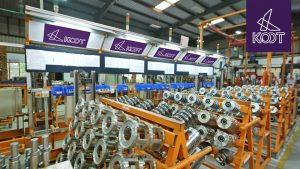Thirst for pumps is unquenchable at Pump Summit Düsseldorf 2016
The market not yet saturated, consumers around the world keep on thirsting for more water and beer. Drinks companies manage to create appetite for more by creating new beverages. There is no question about it, the market is moving stronger than ever before. In any case, pump manufacturers have the right products to keep drinks flowing in streams and make sure everyone’s thirst is quenched.
Pump manufacturers have at all times been able to rely upon thirst for mineral water, and thus demand for their products. Water is one of the most popular thirst quenchers. In Germany, for instance “the per capita consumption 2014 rose for the fourth time in succession and achieved a new record of 143.5 liters,” reports the Association of German Mineral Water Producers VDM. German mineral water producers bottled 10.7 billion litres mineral water, an increase of 2.5 percent. While per capita consumption of lemonades sank in 2014, energy drinks are the latest trend. According to market research institute Canadean demand for the coffeine bombs is growing year for year – in Germany demand rose by 9.1 percent.
A healthy diet and wellness also are important criteria for an increasing amount of consumers when chosing their beverages, challenging the creative fantasy of drinks companies.
China brews the most
Breweries remain strong: even though sales worldwide decreased by 0.6 percent in 2014, to 1.96 billion hectolitres, there still is enough to gulp. China remains the world’s largest brewer, with an estimated annual production of 492.1 million hectolitres. Places two, three and four are held by the USA with 225.9 m hectolitres, in front of Brazil with 140.4 m and Germany with 95.6 million hectolitres.
Non-alcoholic beers are a current trend: since 2010, the German market has grown by over 50 percent, declares the German Brewers Association DBB. „With non-alcoholic beers new target groups were successfully won,” states DBB president Holger Eichele. In 2014 German breweries produced 4.1 percent more, leading to a total of 5.03 million hectolitres. A development pump manufacturers also find to enjoy.
Creative breweries
The market also demands for creative drinks. And breweries have been reacting with remarkable creations such as fruit beer, juniper beer, love beer, rice beer, and chocolate taste beer. Consumers are curious, and enjoy tasting it.
Regardless of what type is being brewed – the process is always the same. Ingredients are roasted, heated, cooked, cooled, stirred and fermented, as well as decanted and bottled. Without pumps, the production process is unthinkable. Beverage pumps are required “for transporting raw materials and for finished products within the plant for transfer, mixing and loading processes,” explains Jung Process Systems.
Handling media gently
Brewing depends on choosing the proper, matching pump. Breweries for instance use twin screw pumps to transport their products. Their axial function sees chambers serve as conveyance chambers, allowing fluids to be transported gently. Low shear and a flexible rotation speed control are also required. As a consequence, highly delicate raw materials, such as hops used for brewing beer, can be gently conveyed. This maintains the quality of the ingredients. Several breweries prefer using progressive cavity pumps and screw conveyors. Progressive cavity pumps have a modular design and are constructed robustly.
In contrast, pumps using impellers, vanes, lobes or valves could damage the sensitive product, emphasises Watson-Marlow. An optimised design allows sensitve products to be conveyed safely, even solids. “This reduces wastage, minimises damage, and results in a high quality finished product”.
High hygiene requirements
Flow behaviour also is an important factor in constructing pumps for the food and beverages industry. “Products such as yogurt, cream or pudding can be partially or completely ruined as a result of their flow behavior if the proper precautions are not taken based upon their characteristic product properties,” explains Netzsch Pumpen & Systeme.
There are high hygienic requirements for each pump used in beverage production – such as in homogenisation, mixing and bottling. In milk, pathogenic microorganisms are found. “Illnesses and allergies from contaminated food are all too commonplace unfortunately,” reports pump manufacturer Lewa. Pump systems therefore need to be designed in such a way that cross-contamination and contamination through abrasion are avoided, by using hermetic seals. For instance, levelling collars in contact with a product are made from an FDA approved special elastomer. Furthermore, claims Netzsch, a dead space free design and polished surfaces fulfill hygiene standards.
Exact dosage
A step before the production process dosage pumps perform their duty. The support pretreatment of process waters. “Very accurately dosing the amount of chemical required, the pumps ensure that the process water does not contain any unwanted substances or flavours that may interfere with the quality of the finished product,” explains Grundfos.
Transport is also decisive for the quality of a sensitive beverage product, and pumps also play an important role here. Jung Process Systems shipped six twin screw pumps to one of the most important worldwide acting trader and processor of citrus fruits. They are used on a fruit juice tanker to pump and re-pump orange juice concentrate and here transport 95 m³/h against 12 bar.
Stainless steel as material
Brazil is seen as the world’s largest producer of oranges. The main amount of the fruits is made into juice, and exported. “The fruit juice is transported as concentrate by so-called fruit juice tankers to their regions of destination,” explains the company based in Kummerfeld, Germany. Orange juice concentrate is stored and transported deep frozen. It is pumped through stainless steel pipes into stainless steel tanks. At the ports of destination the juice concentrate is re-pumped into special cooling and treatment plants. “Frozen orange juice concentrate is highly viscous and places complex demands on pumping, piping and transportation technologies,” claims Jung Process Systems.
Seals also had an important role in this project. Double acting mechanical seals protect the product against outside contaminants and keep cleaning easy.
Shaft seals decisive
Selecting shaft seals for beverage pumps has to be well-considered, as a large amount of products has a high ration of sugar. There is a danger that the slip surfaces of the seals start getting sticky. Mechanical seals with reduced slip surfaces in a knife edge design can be a better variant, as torque transmission is reduced.
Pump manufacturers try to offer the matching solution for the beverage production chains. Thirst and hunger of consumers remains as high as before. Nonetheless, the sector has to tackle problems it can’t influence. The Federal Association of German Beverage Dealers GFGH is burdened by minimum wages and tolls. “Our companies have to deal with seasonal deviations nearly always with temporary workers, whose working hours now have to be painstakingly monitored and recorded,” explains Günther Guder, chairman of the GFGH. Layoffs are a consequence. In view of tolls, costly training courses are required.
Fracking draws criticism
Fracking is a thorn in the side of the beverages industry. The Association of German Mineral Water Producers VDM demands a nationwide ban of fracking in basins with mineral water deposits. “Mineral water is a naturally pure product of nature and may not be treated,” underscores VDM president Stefan Seip. In turn it receives an official seal of approval. “Contamination through fracking can consequently not be revised”. So far, federal states are merely intended to have the right to establish protected zones. Seip: “we demand that the protection of mineral water and other foodstuff also is uniformly ordered through a federal law”. The German Brewers Association DBB demands the same.
Despite of this problem, the DBB draws a positive balance for 2014. Just like the two years before, more than 1.5 billion litres beer worth nearly 1.1 billion euro were exported from Germany. Italy accounted for 20 percent, France for 12 percent and The Netherlands for 11.1 percent of German beer exports. China followed on fourth place, thirsting for 9.8 percent. With a quarter of global beer consumption, the Middle Kingdom is the world’s largest market for beer. It is therefore unsurprising that “especially exports to third states, such as China or the USA, have been growing in the last few years,” states the DBB.
Hot tea most favoured
Incidentally, market research company Canadean states the world’s most popular beverages are hot tea, milk and dairy drinks, carbonated soft drinks, water, beer, coffee and spirits. The amount of beverages consumed per capita has continued to grow over the course of the last seven years – a good outlook for all companies involved in the production process. In order to quench all of this thirst, pumps will have to be in constant use. Now that’s a reason to be happy.
Source: Messe Düsseldorf GmbH






